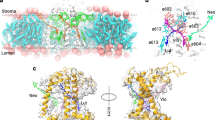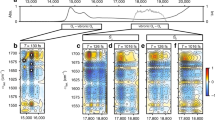Abstract
DURING experiments on pigment orientation in chloroplasts and grana, it was necessary to determine the directions in which linearly polarized light is preferably absorbed in a pigment molecule. This preference corresponds to the directions of maximum transition probability of the electronic transitions which give rise to the different absorption bands in the spectra. By studying dichroism and polarization of fluorescence for chlorophyll a, b, bacteriochlorophyll and the corresponding phæophytins, these directions have been investigated.
This is a preview of subscription content, access via your institution
Access options
Similar content being viewed by others
References
Perrin, F., Ann. de Phys., 12, 169 (1929).
Stupp, R., and Kuhn, H., Helv. Chim. Acta, 35, 2469 (1925).
Longuet-Higgins, H. C., Rector, C. W., and Platt, J. R., J. Chem. Phys., 18, 1174 (1950).
Platt, J. R., J. Chem. Phys., 18, 1168 (1950).
Author information
Authors and Affiliations
Rights and permissions
About this article
Cite this article
GOEDHEER, J. Chlorophyll Spectra and Molecular Structure. Nature 176, 928–929 (1955). https://doi.org/10.1038/176928a0
Issue Date:
DOI: https://doi.org/10.1038/176928a0
This article is cited by
-
Orientation of the porphyrin ring in artificial chlorophyll membranes
The Journal of Membrane Biology (1972)
-
Carotenoid-sensitized Fluorescence of Chlorophyll in vitro
Nature (1958)
-
Photosynthesis
The Botanical Review (1957)
Comments
By submitting a comment you agree to abide by our Terms and Community Guidelines. If you find something abusive or that does not comply with our terms or guidelines please flag it as inappropriate.



